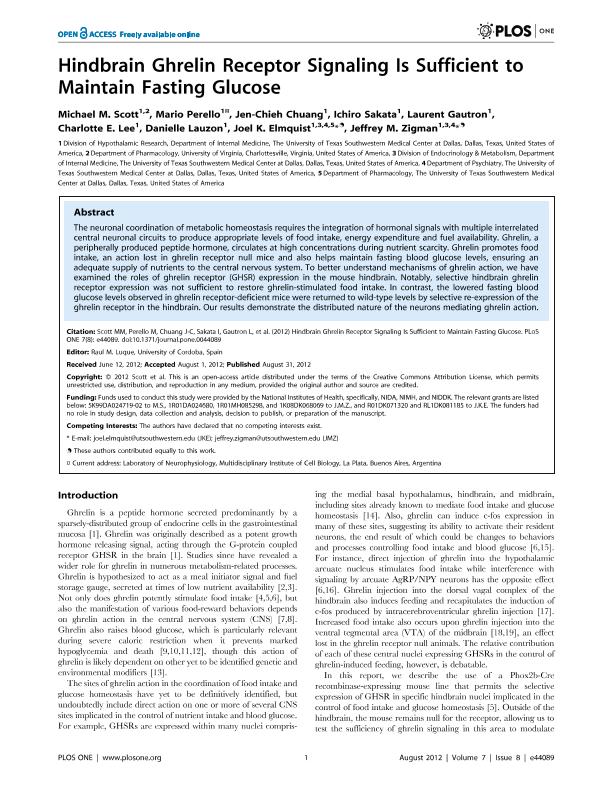Mostrar el registro sencillo del ítem
dc.contributor.author
Scott, Michael M.
dc.contributor.author
Perello, Mario

dc.contributor.author
Chuang, Jen Chieh
dc.contributor.author
Sakata, Ichiro
dc.contributor.author
Gautron, Laurent
dc.contributor.author
Lee, Charlotte E.
dc.contributor.author
Lauzon, Danielle
dc.contributor.author
Elmquist, Joel K.
dc.contributor.author
Zigman, Jeffrey M.
dc.date.available
2019-02-25T19:41:58Z
dc.date.issued
2012-08
dc.identifier.citation
Scott, Michael M.; Perello, Mario; Chuang, Jen Chieh; Sakata, Ichiro; Gautron, Laurent; et al.; Hindbrain Ghrelin Receptor Signaling Is Sufficient to Maintain Fasting Glucose; Public Library of Science; Plos One; 7; 8; 8-2012; 1-6; e44089
dc.identifier.issn
1932-6203
dc.identifier.uri
http://hdl.handle.net/11336/70808
dc.description.abstract
The neuronal coordination of metabolic homeostasis requires the integration of hormonal signals with multiple interrelated central neuronal circuits to produce appropriate levels of food intake, energy expenditure and fuel availability. Ghrelin, a peripherally produced peptide hormone, circulates at high concentrations during nutrient scarcity. Ghrelin promotes food intake, an action lost in ghrelin receptor null mice and also helps maintain fasting blood glucose levels, ensuring an adequate supply of nutrients to the central nervous system. To better understand mechanisms of ghrelin action, we have examined the roles of ghrelin receptor (GHSR) expression in the mouse hindbrain. Notably, selective hindbrain ghrelin receptor expression was not sufficient to restore ghrelin-stimulated food intake. In contrast, the lowered fasting blood glucose levels observed in ghrelin receptor-deficient mice were returned to wild-type levels by selective re-expression of the ghrelin receptor in the hindbrain. Our results demonstrate the distributed nature of the neurons mediating ghrelin action.
dc.format
application/pdf
dc.language.iso
eng
dc.publisher
Public Library of Science

dc.rights
info:eu-repo/semantics/openAccess
dc.rights.uri
https://creativecommons.org/licenses/by-nc-sa/2.5/ar/
dc.subject
Obesity
dc.subject
Hindbrain
dc.subject
Glucose Homeostasis
dc.subject.classification
Inmunología

dc.subject.classification
Medicina Básica

dc.subject.classification
CIENCIAS MÉDICAS Y DE LA SALUD

dc.title
Hindbrain Ghrelin Receptor Signaling Is Sufficient to Maintain Fasting Glucose
dc.type
info:eu-repo/semantics/article
dc.type
info:ar-repo/semantics/artículo
dc.type
info:eu-repo/semantics/publishedVersion
dc.date.updated
2019-01-02T19:31:39Z
dc.journal.volume
7
dc.journal.number
8
dc.journal.pagination
1-6; e44089
dc.journal.pais
Estados Unidos

dc.journal.ciudad
San Francisco
dc.description.fil
Fil: Scott, Michael M.. University of Texas; Estados Unidos. University of Virginia; Estados Unidos
dc.description.fil
Fil: Perello, Mario. University of Texas; Estados Unidos. Consejo Nacional de Investigaciones Científicas y Técnicas; Argentina
dc.description.fil
Fil: Chuang, Jen Chieh. University of Texas; Estados Unidos
dc.description.fil
Fil: Sakata, Ichiro. University of Texas; Estados Unidos
dc.description.fil
Fil: Gautron, Laurent. University of Texas; Estados Unidos
dc.description.fil
Fil: Lee, Charlotte E.. University of Texas; Estados Unidos
dc.description.fil
Fil: Lauzon, Danielle. University of Texas; Estados Unidos
dc.description.fil
Fil: Elmquist, Joel K.. University of Texas; Estados Unidos
dc.description.fil
Fil: Zigman, Jeffrey M.. University of Texas; Estados Unidos
dc.journal.title
Plos One

dc.relation.alternativeid
info:eu-repo/semantics/altIdentifier/doi/http://dx.doi.org/10.1371/journal.pone.0044089
dc.relation.alternativeid
info:eu-repo/semantics/altIdentifier/url/https://journals.plos.org/plosone/article?id=10.1371/journal.pone.0044089
Archivos asociados
